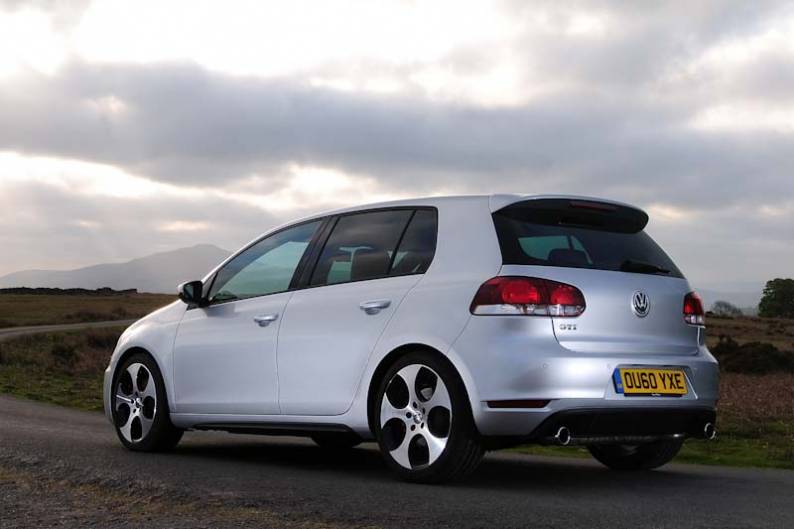
RAC sale – up to 33% off*
• Roadside cover from £5.29 a month†
• We get to most breakdowns in 60 mins or less
• Our patrols fix 4/5 breakdowns on the spot

By Andy Enright
Introduction
There are some buyers who, when looking for a hot hatchback, will only consider a Golf GTI. After all, this is the car that launched a whole genre. The GTI's badge became synonymous with this class of car, much in the same way that vacuum cleaners are widely referred to as Hoovers, inline skating is Rollerblading and artificial turf is usually called Astroturf. These genericised trademarks aren't always welcomed from a purely legal perspective but they remain about as big a tribute as there can be to the products which had the biggest impact in their fields. So if you're looking for a GTI, you choose the GTI right? Here's what to look for when buying the excellent sixth generation Golf GTI, built from 2009 through to 2012.
Models
3/5dr hatch (2.0 petrol [GTI)
History
Where's the justice in the world? The Volkswagen Golf GTI Mk 6 was one of the great Golf GTIs, yet it was only built for three years. The FSO Polonez on the other hand, which most would agree is a hateful piece of tat, soldiered on for 24 years. Which leads us on to a point most of you will realise. Even if you have zeroed in on the Golf GTI as the hot hatch you want, there are good Golf GTIs and there are, well, maybe not bad ones but distinctly less good iterations.
Let's examine the evidence. The Mk1 established the brand and was taut, fun and just generally brilliant but most have been crashed, rusted to pieces, modified beyond recognition or squirrelled away in dehumidified garages. The Mk2 GTI grew a little bigger and spawned the lovely 16v model. Then it all went a little pear-shaped with the flabby Mk3 GTI. The MK4 resurrected things in the styling department at least and although it wasn't the liveliest drive, we started to see some decent power. Cue the Mk5 which featured fully independent rear suspension and was a hoot to punt along a country lane. It was a real return to form but it wasn't without its issues. In focusing on its driving dynamics, Volkswagen temporarily took their eye off the ball when it came to some of the materials quality and many of its key rivals offered interiors that were the equal or better.
The Mk6 Golf GTI is, in many regards, the sweet spot. Available in both three and five door forms and with manual or DSG sequential gearboxes, it retained the Mk5's spirit but upped the quality and improved efficiency. The 2.0-litre engine that powered the GTI was little changed from its predecessor's, the engine getting an additional 10bhp, taking it to 207bhp. Plus, the styling was made a little more polished and the interior felt a good deal plusher. In May 2011, the Edition 35 model was announced, with a 232bhp power output and a few extra pieces of equipment such as '35' badging, unique alloy wheels, a reprofiled side sill design, and a more aggressive front bumper.
What You Pay (used_pay)
What You Get
The Golf GTI revels in its status as the founding father of the hot hatchback genre and it isn't about to lower itself by indulging in the lurid colour schemes and tea-tray spoilers favoured by its lower brow rivals. Therefore, its looks are comparatively low key and classy, much like a standard model but with a soupcon of extra aggression bubbling under the surface. Twin exhausts set into the subtle rear splitter, a lower front bumper with large central air-intake and a neat roof-mounted spoiler at the rear are about the size of it. The alloy wheels are 17" in size but the optional 18" items fill the bulging arches more effectively. Inside, the tone of the standard Golf's class-leading cabin is raised by an abundance of chrome detailing.
The steering wheel is a pleasure to behold and to wrap your mitts around with its contoured rim, red stitching and three spokes picked out in chrome. The sports seats give good support with their pronounced side bolsters but they're better cushioned than the more extreme chair designs in many of the Golf's rivals. There's a feeling of genuine class in the cabin that no other performance hatch save for Audi's prohibitively expensive S3 can match. With a 350-litre boot and respectable amounts of space in the back despite the fat-backed sports seats, the GTI can even do practical family transport with some aplomb.
Buyers have two gearboxes and two bodystyles at their disposal when specifying their Golf GTI. Both three-door and five-door versions are available, with the former sporting slightly more dynamic looks and the latter offering more by way of practicality. The standard transmission is a six-speed manual but Volkswagen's acclaimed DSG twin-clutch gearbox was also available to new model buyers for a £1,200 premium, complete with wheel-mounted paddle shifters. The GTI specification includes dual-zone climate control ESP stability control, ABS brakes and seven airbags, including a driver's knee airbag.
What To Look For (used_look)
What You Pay
Please fill in the form here for an exact up-to-date information.
What to Look For
Keep a look out for cars that have been flogged by corporate users and ensure that servicing has been attended to diligently. Check the car's specification carefully, as some advertisers will list the DSG box as a 'manual gearbox'. You'll also need to watch for sales staff aggressively pushing Mk5 cars, knowing that the Mk6s will virtually drive themselves out of their dealerships. The GTI's alloys are very prone to kerbing and replacement front splitters for Edition 35s are very expensive.
Replacement Parts
(approx based on a 2010 Golf GTI excl. VAT) Parts aren't priced too badly. A clutch assembly will be around £75 and an alternator should be close to £115. Brake pads front and rear are about £65 and £50 respectively.
On the Road
The imperious 2.0-litre TSI petrol engine that powered the MkV Golf GTI appears again in the sixth generation car. It was a remarkably slick and capable piece of engineering then but revised piston rings, an upgraded oil pump, a high pressure fuel pump and a completely revised induction system promise competence at an even higher level. The maximum power output is 207bhp, a 10bhp increase over the previous generation car and as before, the turbocharged engine piles on its acceleration in a beautifully smooth and progressive manner. That peak power is achieved between 5,300 and 6,200rpm but the maximum torque of 279Nm is generated constantly between 1,700 and 5,200rpm. The upshot is that while you're idling at the traffic lights, 62mph is just 6.9 seconds away and assuming you're not on a public road, a top speed of 149mph is attainable.
Getting the most out of an engine like the 2.0-litre TSI in a front-wheel drive hatchback is a tricky engineering task but Volkswagen's men in white coats didn't shrink from the challenge. The basic suspension set-up mirrors that of standard Golf models, with MacPherson struts at the front and a four-arm multi-link arrangement bringing up the rear. Elsewhere, however, the changes are far-reaching. The springs and dampers have been completely re-tuned to deliver the focused driving experience the GTI is known for, lowering the ride height by 22mm at the front and 15mm at the rear. There are stiffer anti-roll bars to keep the Golf flat through fast corners and Volkswagen's Adaptive Chassis Control technology lets the driver select Comfort, Normal or Sport modes according to their mood.
The ACC system electronically adjusts the throttle response, steering assistance and damper settings to affect the way the car drives but perhaps the most significant feature on the MkVI GTI is the XDS electronic differential. This uses the traction and stability control systems to help the front wheels deploy the GTI's power more effectively. It means reduced wheelspin and better traction as you accelerate out of tight corners.
Overall
There's precious little that goes wrong with the Mk6 Golf GTI. It holds its value well, it's presentable in virtually any occasion and that's why you want one. There's never been a bad Mk6 GTI made, so making recommendations is a little onerous. Just make sure the car you're looking at has been cared for diligently and you're onto a surefire winner here. When it comes to being able to entertain and do the family duties, the Golf GTI is still the boss.





![Volkswagen Polo [9N] (2001 - 2005) used car review](https://d1ix0byejyn2u7.cloudfront.net/drive/images/made/drive/images/remote/https_d2yv47kjv2gmpz.cloudfront.net/filestore/1/7/3_b23e0c473238914/7b8228f4379ae6559e2ed7d913bc912c/371_de542838df0f96f_100_100_70_c1_c_c.jpg)

